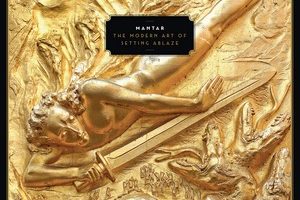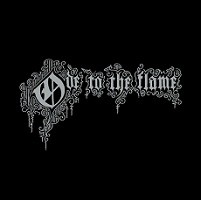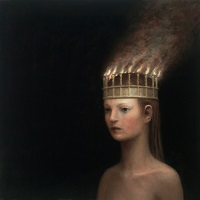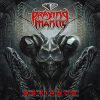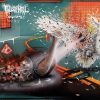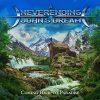Mantar – Nowhere to Hide
Thursday, 23rd August 2018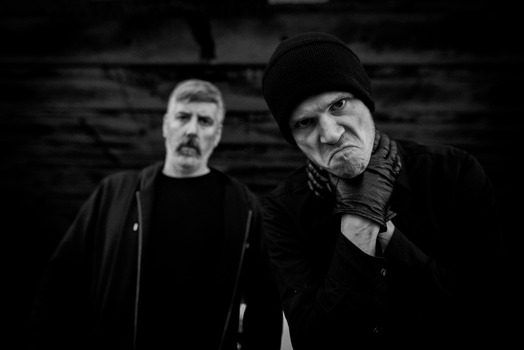
Growing to be known by their DIY ethos and drive, Mantar have managed to complete three albums in their relatively short existence. Going at it as a two-piece, there’s something to be said for Mantar’s admittedly raw and straight-forward attack. There’s simply guitar, drums, and vocals. No excesses, no additives, just a focus on writing riffs above all else. It’s this formula that has allowed them to gravitate to larger and larger audiences. In an age of ‘more is more,’ Mantar provides a meat and potatoes approach that eschews the expanding norm, and is seen as the genuine article. For these reasons, we reached out to guitarist/vocalist Hanno to discuss the band’s path. Some honest talk about Mantar’s sound and approach await, as well as working as a duo, and how The Modern Art of Setting Ablaze relates to today’s world.
Dead Rhetoric: How does The Modern Art of Setting Ablaze compare to your other releases?
Hanno: I think a lot of bands say this, but I’m proud of the fact that it’s uniquely Mantar. On the other hand, I think the songwriting just got better. We’ve been a band now for 5 years, and we have released three records in that time. I think this is the first record that you can really hear that we have found our own style of music. On the first record, it was pretty much a punk rock approach and also on the second one as well. I really like writing songs. I don’t want to make a genre record. Like, “Hey this is a great death metal record. Or doom, sludge, black, or what have you.”
I wanted to make sure it was a Mantar record. The songs stand out from themselves, every song differs from the others. Each song on the record is unique, and I think they are much more on point than the previous records. So I assume the songwriting just got better. We found out what we are really good at and tried to concentrate on our strengths and stay away from the bullshit. Not that there’s bullshit on the other two records, but this one is more unique.
Dead Rhetoric: You were saying you found your sound. What do you think defines Mantar then?
Hanno: At this point, I don’t know. I just know what defines the band’s sound in general. There’s no gimmicks. There’s nothing we can hide behind. We are just drums and guitar. There’s no guitar solos, there’s no keyboard layers, no backing vocals – we have to have a strong riff and a strong melody, and a beat that makes you move your head. That’s pretty much all we can offer, and if you can combine that and make a good song out of these pure, primitive ingredients, it works very well. I think that’s what we did with the 12 songs on the record. We really know how to use the purposely limited weapons we have.
Dead Rhetoric: That goes along with something cool I saw in the promo sheet, with your currency being “riffs, riffs, and riffs.”
Hanno: Yeah – I grew up with classic rock, and to be very honest with you, I don’t listen to very much underground stuff, except the super underground primitive black metal stuff, but man, I love AC/DC, ZZ Top, and stuff like that. I’m a classic rock guy. I live in Florida, I’m a simple person [laughs]. For real, that’s what makes Mantar refreshing to some people. We aren’t trying to sound like another band. If we sound like another band here or there, it’s fine with me, but we aren’t the 100,000th Entombed ripoff or the 160,000th Obituary ripoff. We do our own thing.
I think the success that Mantar has, if you want to say it, the musical genius of Mantar is based on pure ignorance. I seriously don’t know to this very day if Erinc knows the difference between death and black metal. He likes Sisters of Mercy. I think that’s a good thing. Without being cocky, it’s this ignorance that hopefully makes us interesting and fresh to the fans. We really don’t try to steal another band’s identity. That’s something you can only fail in. In “riffs, riffs, riffs,” I’m not a super good musician. Neither is Erinc – he knows how to keep the time and play some groovy as fuck beats. I know how to play simple yet very effective riffs that stick in your mind. Therefore, I might be way more inspired by bands like Nirvana and AC/DC than I’m inspired by Slayer and Entombed, because a catchy riff is a catchy riff.
Dead Rhetoric: So how important is the bond between the two of you when it comes to songwriting?
Hanno: The songwriting process changed. I live in the United States nowadays, and Erinc lives in Germany, and it’s going to stay that way most likely. When we started being a band, we were like any other band. We met like 2-3 times a week in order to rehearse and jam, and based on that we created music. But in the last four years, we have been on a constant tour, studio, or whatever. We really needed to give each other some space to be creative. That’s what made the record possible in the first place. I needed time on my own, without other people. I really like being alone, but in the band context, it was very important that I was able to sit on my porch or my couch without the pressure of being creative together, and just write riffs, create music, and think about new song ideas.
Earlier this year, we got together in Germany and I presented all the material I gathered over the last year, and based on that material we made songs out of it. The songwriting is different nowadays, but for me personally, it’s very positive. When you spend so much time together, you have to be careful that you do not kill the vibe. It’s very important and you have to be very sensitive about that. It was very good that we had the time for ourselves this time.
Dead Rhetoric: I can see that. With it being just the two of you, after a certain point you either need some time away or it just implodes.
Hanno: Yeah, sometimes things get very intense. Some people think it’s a total blessing being a two-piece band, and it’s great sometimes because there’s no democracy – if either of us don’t like a certain idea, it’s not going to be made. It’s off the table and not going to happen. But to keep a certain vibe, you have to develop a very good strategy in dealing with conflicts and things like that. It’s like a marriage man, you are around each other all the fucking time, so you have to get some sort of sense of when you need to give the other one space. It’s crazy, and therefore I’m very happy that I live in Florida. I want to remain friends, and good players. So you need to give each other space.
To be honest, I’m a bad team player. I want to be in control of everything. That’s why we still, in working with Nuclear Blast, we maintain this strict, DIY ethos. We do everything ourselves – the shirts, the artwork, the songs, the producing – everything. We don’t even send demos to Nuclear Blast. Until the very moment we are truly convinced of the material, we don’t send it to anyone there. It’s to maintain as much independence as possible. I don’t want anyone to try to convince me to release something that I’m not 100% satisfied with.
Dead Rhetoric: Each album has something to do with fire. Was this something that was planned?
Hanno: I’m very fascinated by fire. It’s a great, strong element. What I like about fire is that it doesn’t accept compromises or any element next to it. It has the power to wipe every plague on this world out and reset everything to zero. It’s a cleansing fire – that’s something I really like, the philosophical idea of fire. We did not necessarily plan on making three records with the reference to fire, we did for the first two but for the third one, I just had this title – The Modern Art of Setting Ablaze – because of the times we are living in and the way that people treat each other. Then I realized that there was a fire reference again. It’s cool, it’s funny, but it’s not like it’s this concept album or whatever. But in general, fire I like a lot. We have a lot in common. Also, what I like about fire – it’s unstoppable.
Dead Rhetoric: As long as we are on the subject, could you talk about the album cover as well?
Hanno: The album’s cover comes from our hometown in Germany. Sixty miles south from Hamburg, there is this piece of art and it has hanged there for 80 years. It has a pretty dark historical background. It was made in order to flatter the Nazi Party back in the 1930s and they didn’t like it, so they kicked out the artist out of the Party. What’s important about it is that it still hangs there, 80 years now, uncommented. No one explains, especially to young people, what it is about.
I think we live in a time where people are again falling for false prophets and leaders, and for generations people have refused to think for themselves, instead hiding in the hate of the masses. I think that is a part of the current political climate we are living in, and that it’s not a big difference to 80 years ago. It’s dangerous as fuck, and people are dangerous as fuck. One person alone might be an intelligent human being, but already with two or three of them, they become a hysterical mass. That’s what you see today in the US, Europe, pretty much all over the world. People try to follow strong leaders, and that’s dangerous as fuck. I’m not even talking about certain political directions, it can also refer to religion as well. It’s dangerous – these are dangerous times.
With this cover, we just wanted to express, how nowadays, it’s a big topic that people refuse to learn from the past and think for themselves. I couldn’t find any better piece of art to express that than this one. It’s quiet. It’s not a fucking pile of corpses in a concentration camp or fucking yourself with a cross – none of that one-dimensional bullshit. It’s a quiet, dangerous piece of history that still has its place in cities and in the minds of man today. It’s still super easy to be set on fire by certain people. With the title, The Modern Art of Setting Ablaze, of course I’m referring to fire in the minds of man. It makes sense to me to put that on the cover.
Dead Rhetoric: I think what’s scary to, as you were saying, is that people want a strong leader, but it’s not necessarily the smart person, it’s whoever shouts the loudest.
Hanno: It’s dangerous as fuck. Two or three people are a hysterical mass. I don’t trust anyone. I mean, I like talking to you, and I have a few good close friends. I’m not a misanthrope, but as of this moment, I’ve kind of lost faith in the overall concept of mankind. A modern society scares the shit out of me. Everything is based on manipulation and hate, and the attempt to control people. We are not necessarily a political band, because we don’t necessarily offer a solution or a better idea, and I don’t want to beat people with soiled political slogans. That bores the hell out of me. It’s more like a morbid fascination of the stupidity of man.
Dead Rhetoric: What do you feel works best about an approach with 3-4 minute songs?
Hanno: I don’t know, because I think in rock and roll standards. I grew up on simple pop music. No matter if it’s heavy metal or Roy Orbison. I only know 3-4 minute songs. I’ve never been interested in creating 11 minute black metal soundscapes, or 14 second grindcore songs. I’ve listened to AC/DC since I was a kid. It’s all I know. The only currency I can pay you in is a song with a catchy riff and groovy drum beat. To me, after 3-4 minutes everything about the song is said. It’s simple, primitive music – I did not need to reinvent the wheel. I just wanted to cook my own soup. Erinc grew up with ‘80s pop music and I grew up on classic rock. If you combine that with a strong urge and the fascination of beauty and violence, then you get what Mantar sounds like.
Let’s face it, if you take a song like “Age of the Absurd,” of course it’s dark and sinister and heavy, but it’s catchy as fuck. That’s the only music I’m good at playing. I am best at playing very heavy pop songs [laughs]. That’s rock and roll to me – I want to write a song that sticks in your head. If you can’t sing along, the best case scenario the second or third time around is that it’s recognizable. Therefore, it’s different from other bands. I know a lot of bands that are super majestic and stunningly beautiful in the 8-10 minutes of black metal or post-rock soundscapes, but don’t tell me you know how to write hits. I don’t want to write hits, but I want to write good, catchy songs. It might not be interesting, but it’s the truth. Nowadays, bands don’t want to admit that it’s cool to write a catchy song, but for me, the hardest thing is to write a catchy song. Everyone wants to be so interesting and progressive but fucking entertain me. Work your ass off and play me some sing alongs!
Dead Rhetoric: That’s very true with the metal underground. People don’t want something simple, they want 500 riffs per minute.
Hanno: They want to be interesting, artsy-fartsy or whatever. There are very few bands that know how to do that. But on the other hand, it’s not my game so I don’t try to participate. We are a very one-dimensional band. We try to play the heaviest music we can, but also the best songs we can. I have no problem with being a primitive, one-dimensional band and write good songs. I challenge other bands to write a better song. I see a lot of bands hiding behind gimmicks. A lot of effect pedals, a lot of production, a lot of band members, guitar solos, synth layers, and that’s cool, but one thing is that we have nothing to hide. We sound the same as we do on record. We record with the same equipment that is in our rehearsal room and our van in order to play live. There is no gimmick, and that’s something I don’t think there’s much of today.
Dead Rhetoric: I think the honesty of what you are doing is what people pick up on. It’s genuine.
Hanno: We try. We don’t have the musical skill to sound like other bands. Let’s say I adore Bolt Thrower or Obituary. I wouldn’t even know how to touch the guitar to play a riff like that. Erinc doesn’t even have a double bass. He can’t even play a blast beat. We just can’t. We have no choice but to do our own thing.
Dead Rhetoric: What do you feel that you’ve learned in the six years that the band has been in existence?
Hanno: How much fucking honest hard work it is. How little romance in being a touring band is. How this, in no time, became a 24/7, 365 days a year job. Don’t get me wrong, I don’t want to sound negative whatsoever, but your friends see you traveling around the world playing the US, Japan, Europe, etc but it’s only possible because we have a very strong work ethic. I learned how much hard work it is. I also learned that sometimes you cannot control everything. Sometimes you come to a country that you’ve never been in before. You don’t know how the people are going to react. The backline is very shitty. But you still have to chug your beer and go out and play the best show you can, because the people don’t give a shit what kind of amp you are playing, or if there are 60 people there. You better slay, or else you suck, and they won’t forget that. For good reasons, that I do understand and appreciate. That’s something that we have been good about.
We don’t hide behind excuses like having our own amp or Erinc’s cymbals not being perfect. People don’t care if you miss a note here or there, or sound a bit crappy. They can see the fire and passion, and if you are really willing to fuck everything up. That’s something that we have learned – you can wake us up anywhere at 4AM on a Monday morning, and we can still play 99% the same as if it’s a Saturday night back home. If you don’t have that, or are willing to do that, especially in the United States where there are so many good bands there, no one is going to wait for you unless you slay and convince people right away. I think that’s fair.
Dead Rhetoric: What’s next for Mantar once the album is released?
Hanno: There’s two months of regaining some power after we finish all the festival and club shows this summer. The last free day I had was sometime last year. Then we are playing a European tour with Skeletonwitch. Then it’s almost Christmas, and we will start all over again [laughs].











